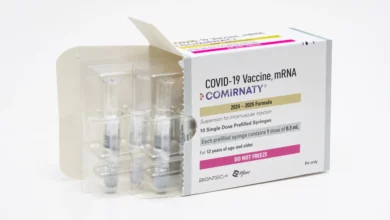The Director of the Department of Communicable Diseases at the WHO Regional Office Evan Houten stated that though Egypt was making tremendous efforts in fighting the novel coronavirus (COVID-19), more needed to be done.
Houten, the team leader of a WHO mission dispatched to Egypt, confirmed that work was underway after several days of intensive field meetings and visits inside and outside Cairo – especially regarding early detection, laboratory testing, isolation, contact tracing, and the referral of patients.
A team of WHO experts concluded its technical support mission on COVID-19 in Egypt on March 25.
The mission’s aim was to assess the current situation, review the current response, provide field support if necessary, and identify strengths and weaknesses.
More work still remains to be done, Houten said.
“We still have an opportunity at these critical moments to combat the spread of disease more effectively before it progresses from the individual to the community level. We have agreed on multiple areas that can be strengthened and expanded, with an approach that includes the entire government and society as a whole,” he said.
Houten that the government was making great efforts to provide human and financial resources to contain the outbreak.
Progress is being made in raising the number of decentralized laboratories that can now test the new coronavirus, as Houten explained that there are currently 17 laboratories with four more to soon be added, besides university hospital laboratories.
Thanks to support from the WHO and other partners, Egypt can take up to 200,000 tests, he said.
Egypt’s well-established disease surveillance system and efforts to track contacts have proven effective in combating and managing individual and group cases before they spread.
Now, the recent border closure provides an opportunity to enhance screening and rapid testing utilizing a risk assessment approach, he said.
Houten added that an effective follow-up of contact tracing using appropriate quarantine mechanisms, and continued systematic testing of patients seeking treatment for all acute respiratory infections, ensures that no critical cases of COVID-19 disease go neglected.
Building on the current well-organized infection prevention and control program, WHO will work with Egyptian health authorities to strengthen isolation, quarantine and referral mechanisms, and enhance infection prevention and control practices, to prevent disease transmission at all levels and ensure the protection of patients and health workers, Houten said.
Continued efforts are being made to ensure that the public is kept abreast of developments, such as working with other sectors to reach vulnerable populations.
Coordination and partnerships with civil society organizations, NGOs, and media will ensure the public can make informed decisions, without being drawn to the suspicion and stigma associated with the disease, Houten said.
“It is clear that health personnel and workers are working with all seriousness and commitment to combat this outbreak and save lives. The battle against the coronavirus is still ongoing in Egypt, and we need to involve everyone in the fight.”
Egypt confirmed on Thursday six additional deaths and 41 new coronavirus cases, bringing the total number of cases confirmed so far in the country to 536.
Thirty people have died from the virus in Egypt.
Edited translation from Al-Masry Al-Youm
Image: A passerby has his temperature checked for free with a device belonging to a shop, due to the coronavirus disease (COVID-19) outbreak, in Cairo, Egypt March 19, 2020. REUTERS/Mohamed Abd al-Ghany




